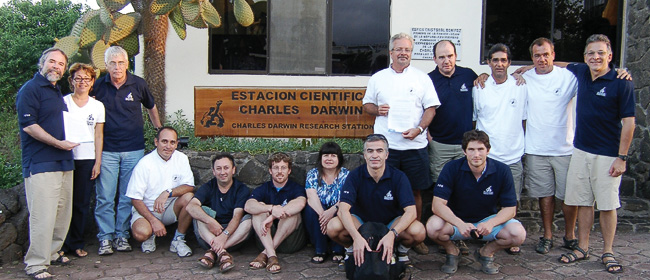UNT Partners with Darwin Foundation
UNT scientists and philosophers are trying to find ways to support ecotourism.
September 28, 2010

Representatives of the Sub-Antarctic Biocultural Conservation Program traveling to
the Galapagos Islands included UNT philosophy and biology professors Ricardo Rozzi
and James Kennedy, standing at left, and program coordinator Christopher Anderson,
sixth from left. (Photo by Alex Ontanada)
UNT scientists and philosophers will work with the Charles Darwin Research Station to find ways to support ecotourism and confront challenges threatening the Galapagos Islands and the Cape Horn Archipelago.
A delegation of UNT and Chilean representatives with the university’s Sub-Antarctic Biocultural Conservation Program and the Omora Ethnobotanical Park in the Cape Horn Archipelago traveled to the Galapagos in June to sign a cooperative agreement between the Omora Park and the Charles Darwin Foundation to support conservation and sustainability. Representatives from UNT, the Universidad de Magallanes in Chile and Chilean tourism operators met with their Ecuadorian counterparts from institutions including the Pontific Catholic University of Ecuador, the International Union for the Conservation of Nature, the Regional Office of UNESCO, the Charles Darwin Foundation and authorities from the Galapagos National Park and tourism industry. The new collaboration will involve joint projects, exchange programs and technical support.
In 2009, a formal agreement between UNT and the Universidad de Magallanes created the Sub-Antarctic Biocultural Conservation Program to integrate environmental ethics and ecological sciences.